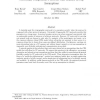Free Online Productivity Tools
i2Speak
i2Symbol
i2OCR
iTex2Img
iWeb2Print
iWeb2Shot
i2Type
iPdf2Split
iPdf2Merge
i2Bopomofo
i2Arabic
i2Style
i2Image
i2PDF
iLatex2Rtf
Sci2ools
107
click to vote
FOCS
2004
IEEE
2004
IEEE
Universally Composable Protocols with Relaxed Set-Up Assumptions
A desirable goal for cryptographic protocols is to guarantee security when the protocol is composed with other protocol instances. Universally Composable (UC) protocols provide this guarantee in a strong sense: A protocol remains secure even when composed concurrently with an unbounded number of instances of arbitrary protocols. However, UC protocols for carrying out general tasks are known to exist only if a majority of the participants are honest, or in the common reference string (CRS) model where all parties are assumed to have access to a common string that is drawn from some pre-defined distribution. Furthermore, carrying out many interesting tasks in a UC manner and without honest majority or set-up assumptions is impossible, even if ideally authenticated communication is provided. A natural question is thus whether there exist more relaxed set-up assumptions than the CRS model that still allow for UC protocols. We answer this question in the affirmative: we propose alternative...
FOCS 2004 | Relaxed Set-up Assumptions | Set-up Assumption | Theoretical Computer Science | UC Protocols |
Related Content
| Added | 20 Aug 2010 |
| Updated | 20 Aug 2010 |
| Type | Conference |
| Year | 2004 |
| Where | FOCS |
| Authors | Boaz Barak, Ran Canetti, Jesper Buus Nielsen, Rafael Pass |
Comments (0)

